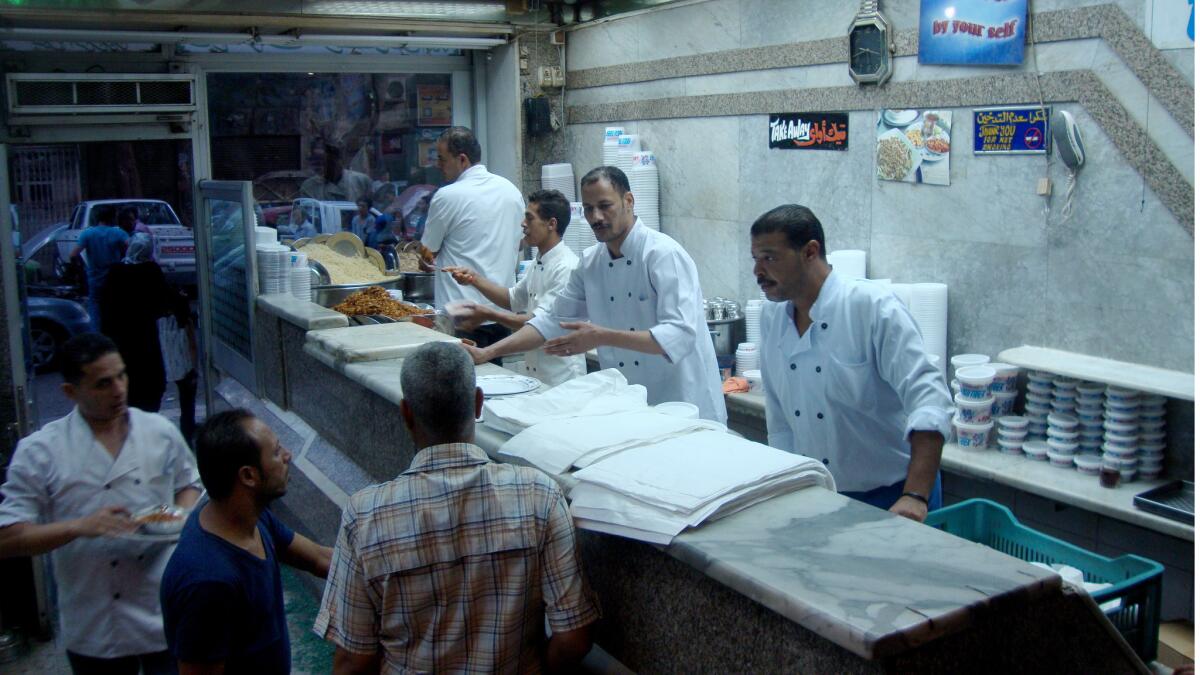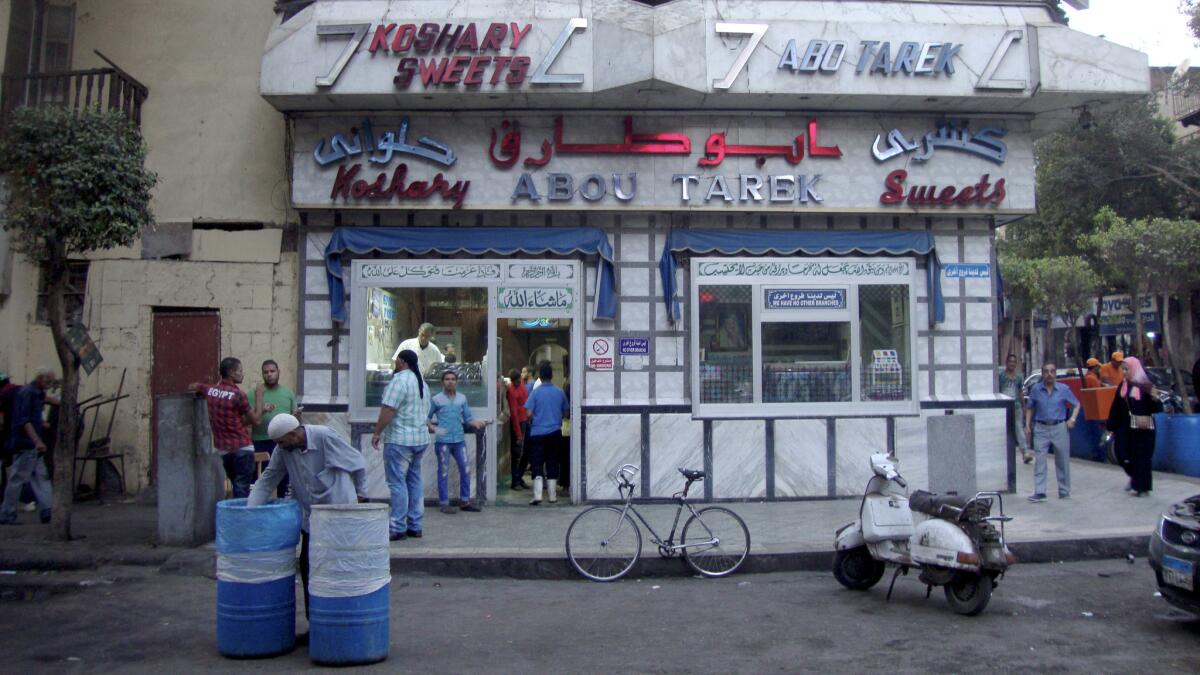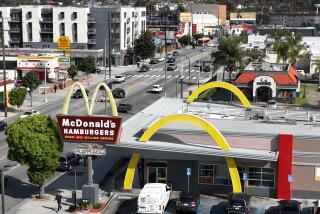Koshary is Egypt’s ‘plate of the poor.’ But it’s no longer so cheap

Reporting from Cairo — Mounds of lentils, rice, chickpeas, vermicelli and macaroni simmered near vats of spiced tomato sauce and crispy fried onions.
Every few moments, a cook in an open-air shop ladled out portions and heaped the finished dish — a plate of pure Egypt known as koshary — into containers for a line of lunchtime customers.
There are plenty of traditional choices for lunch in Cairo. There is molokhiyya, a slimy green stew of jute leaves; there is ful, steamed fava beans; or tamiyya, fava beans seasoned and fried into patties. None are as ubiquitous as koshary, whose savory aroma wafting from open doorways on a hot Cairo afternoon blends with the scent of belching taxis, sweating pedestrians and plodding donkeys.
Now koshary, often known as “the plate of the poor,” is getting more expensive.
The price of a large bowl has nearly doubled over the past five years, to about $1—a hefty sum to Egyptians who last year earned an average of $98 a week. And purveyors warn it could go up even higher.
“Everything is more expensive: sugar, rice, meat. People can’t take it anymore,” Shadya Mohamed, 57, a widowed mother of five, said recently as she picked up a small serving at Koshary Zamzam in the crowded neighborhood of Dokki. “Everyone is upset about it.”
Across Egypt, food prices have soared as political upheavals have roiled the economy, damaging tourism, a major source of income. Low oil prices have compounded the problem.
In a country where increases in the prices of food staples have always been a source of popular unrest, there are growing concerns about recent trends— shortages of baby formula, sugar and other staples, tainted meat and fruit. And now koshary costs $1.
Last week, the International Monetary Fund approved a three-year, $12 billion bailout for the nation’s troubled economy. Egypt will receive $2.75 billion immediately, with the rest subject to economic performance and further reforms.
President Abdel Fattah Sisi had tried to control food costs by propping up the Egyptian pound, which trades at about two-thirds of its official value, a tactic which has had the effect of scaring potential investors and driving inflation, now at 15% and rising.
But earlier this month Egypt, in an attempt to boost international confidence, floated its currency, a move that reduced the pound’s value against the dollar by almost half.
As Egypt’s population reached 93 million, demand for food — stoked by government subsidies — has outstripped local production. As a greater share of koshary ingredients are imported, sellers are considering further price hikes. Lentils are almost entirely imported. So are cooking oil and wheat, used to make the pasta in the dish.
Further adding to public ire is the fact that corruption seems to have made matters worse. Federal prosecutors are investigating accusations that agriculture ministry officials stole about $60 million slated for buying wheat from local farmers.
Economic discontent contributed to the Arab Spring uprising in 2011 and the fall of President Mohamed Morsi’s Muslim Brotherhood-backed government in a 2013 coup, which brought Sisi to power.
Former President Anwar Sadat sparked deadly riots in the 1970s when he tried to reduce bread subsidies. Nearly 80 people died, hundreds were injured and more than a thousand were arrested. Sadat soon reversed the order.
Now, Egyptians worry about another “revolution of the hungry.”
Activists calling themselves the Movement of the Poor last week were trying to build support online for new protests against government austerity measures using the hashtag #ghalaba, Arabic for “poor.”
Sisi warned against protests and the government cracked down, rounding up Muslim Brotherhood organizers and sending riot police to patrol gathering places in Cairo, Alexandria and other cities. Some protesters appeared, but they failed to muster much support.
H.A. Hellyer, senior nonresident fellow at the Atlantic Council in Washington, D.C., said the government is obviously worried that rising food prices and other austerity measures could trigger unrest that may not be easy to quell.
“A riot here, a riot there, then it catches fire. That’s what people are worried about,” he said.
A riot here, a riot there, then it catches fire. That’s what people are worried about.
— H.A. Hellyer, senior nonresident fellow, the Atlantic Council
“One of the reasons why you see the government being so reluctant to move forward on some of these economic reforms is they are worried about the backlash. There would be a huge impact on things people have taken for granted for years.”
At the same time, the chaos that has erupted across the Middle East after the initial Arab Spring uprisings is likely to act as a handbrake for many of those who don’t want Egypt to descend into the violence of Syria or Yemen.
“They’ve had two revolutions; overthrown the government twice. Their situation has gotten worse after both,” said Timothy Kaldas of the Tahrir Institute for Middle East Policy in Washington. “That does instill a level of caution in people about doing it again.”
At the same time, unhappiness over rising inflation is pervasive. Hellyer said his mother, who lives in Egypt, recently ordered a dishwasher. By the time she got to the store to pick it up, its price had gone up by $50.
“They said, ‘We’re not ripping you off, it’s imported and the prices are going through the roof,’ ” he said.
While the government has started cash transfers to the poor, it’s difficult to target those most in need since many work off the books, analysts say. Cutting subsidies and floating the currency will increase the burden on the poor at a time when vegetable and fruit prices have already increased 36% compared with last year.
“There definitely is a concern within the government about moving too fast, putting too much of a strain and upsetting people. I don’t think they have reached a consensus about how to strike the appropriate balance,” Kaldas said.

At El Etemad market in downtown Cairo, owner Magdi Salah was standing at the cash register recently, surrounded by stacks of rice, sugar and other staples and fielding complaints from customers aggravated by escalating prices.
As his son stocked the deli and local workers darted in, Salah, 60, blamed “the greed of merchants” as being among the reasons for higher prices. He said price gouging is part of the reason the price of a kilo of rice more than doubled this year, as traders withheld their supply, despite a surplus. In an effort to curb soaring prices, the Egyptian government banned rice exports.
“The merchants buy the subsidized rice and put it in new packets and sell it at a new price,” he said as he stood behind his counter serving customers. “What’s needed are tougher laws. If I was Sisi, I would make it like martial law: If you sell at an inflated price, you go to jail.”
A customer approached with a package of bread sticks. As Salah rang him up, the man complained about the price, which had increased a fraction of a cent. Salah nodded patiently.
A few blocks away during lunch at Koshary Abou Tarek, Reda Hammoda said he had been scrimping, including on toys for his three children, but he has faith the economy will improve.
“I’m optimistic,” said Hammoda, 38, who works in construction. “We’re in a dark place now, and we’re getting out of it.”
Youssef Zaki, the restaurant’s owner, said he has tried to balance profit with customer satisfaction, raising prices slightly and using different plastic takeout containers when the price of plastic increased.
“You can’t deny people a cheap meal,” Zaki said. “I won’t raise prices too much. The margin of profit doesn’t have to be so great that we lose customers.”
Zaki, 70, who took over the koshary business his father started as a corner stand 50 years ago, calls it the perfect comfort food for trying times.
“People hear about questionable meat and corruption,” Zaki said, “Koshary is safe.”
ALSO
Obama will spend his final presidential trip abroad trying to reassure the world about Trump
Islamic State is killing civilians, but these Mosul residents still won’t flee
Israel moves forward with legislation that would ban mosques from using loudspeakers
More to Read
Sign up for Essential California
The most important California stories and recommendations in your inbox every morning.
You may occasionally receive promotional content from the Los Angeles Times.











